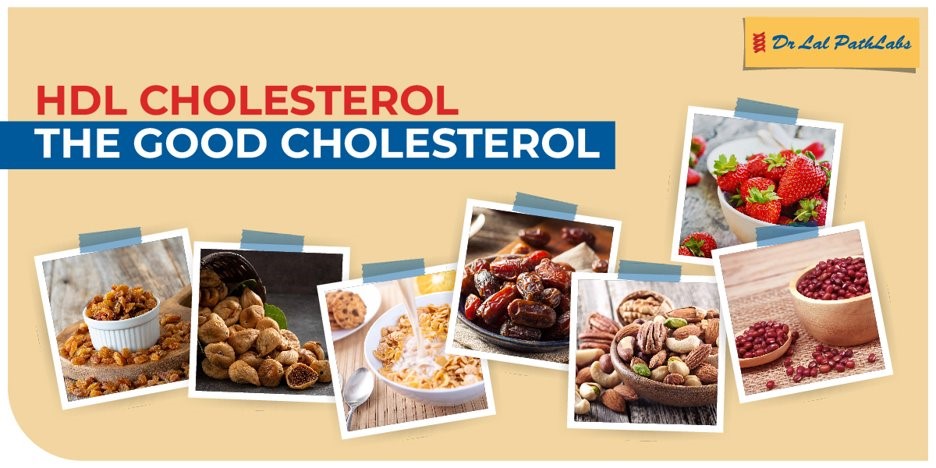Understanding HDL Cholesterol: The Good Cholesterol
- 1 Aug, 2023
- Written by Team Dr Lal PathLabs
Medically Approved by Dr. Seema
Table of Contents
Introduction
Cholesterol, a lipid in our bloodstream, is vital for various bodily functions. However, not all cholesterol is the same. High-density lipoprotein (HDL) cholesterol, popular as “good cholesterol,” is pivotal in safeguarding cardiovascular health. In this blog, we will discuss the importance of HDL cholesterol, its role in maintaining heart health, factors affecting HDL levels, and strategies to improve HDL cholesterol levels.
Understanding HDL Cholesterol: The Good Cholesterol
HDL cholesterol, or high-density lipoprotein, is often called “good cholesterol” due to its crucial role in promoting cardiovascular health. Unlike low-density lipoprotein (LDL), which is considered “bad cholesterol” as it can lead to the build-up of arterial plaque and increase the risk of heart disease, HDL works beneficially.
The key reasons why HDL is labelled as “GOOD CHOLESTEROL” are:
- Its most important function is “reverse cholesterol transport,” where it extracts excess cholesterol from blood vessel walls and returns it to the liver for elimination.
- Higher HDL-C levels improve the capacity to remove cholesterol, preventing dangerous blockages in blood vessels.
- HDL-C helps keep blood vessels widened, promoting better blood flow.
- It has antioxidant and anti-inflammatory functions, reducing blood vessel injury and contributing to heart health.
Optimal Levels of HDL Cholesterol for Heart Health
The optimal HDL cholesterol levels can vary depending on individual factors and health conditions. Generally, higher HDL cholesterol levels are considered more favourable for cardiovascular health. The American Heart Association (AHA) provides the following general guidelines for HDL cholesterol levels:
- For men: An HDL cholesterol level of 40 mg/dL or higher is considered good. An HDL level of 60 mg/dL or higher is optimal and associated with a lower risk of heart disease.
- For women: An HDL cholesterol level of 50 mg/dL or higher is good. An HDL level of 60 mg/dL or higher is optimal and associated with a lower risk of heart disease.
It is important to note that these are general guidelines, and individual health factors, including age, sex, family history, and other medical conditions, can influence what is considered optimal for each person. A healthcare provider can help determine the ideal HDL cholesterol level based on a comprehensive assessment of an individual’s health and risk factors.
Factors Influencing HDL Levels
Many factors influence HDL levels, some of which can be modified through lifestyle changes. These factors include:
- Genetics: Genetic predisposition can influence HDL metabolism and levels. Although we cannot change our genes, awareness of genetic factors can help inform personalised management strategies.
- Dietary Habits: A heart-healthy diet rich in unsaturated fats, found in avocados, nuts, and olive oil, can boost HDL levels. Incorporating omega-3 fatty acids from sources like fatty fish is also beneficial. Conversely, excessive consumption of trans fats and refined carbohydrates can decrease HDL levels.
- Physical Activity: Regular exercise is a powerful way to elevate HDL levels. At least 150 minutes of moderate-intensity aerobic activity per week promotes heart health.
- Smoking and Alcohol: Smoking harms HDL levels, while moderate alcohol consumption may positively affect HDL. However, the AHA does not recommend starting to drink alcohol solely for its potential benefits, considering the health risks associated with excessive alcohol intake.
- Weight Management: Maintaining a healthy weight or losing excess weight through a balanced diet and regular exercise can favorably impact HDL levels.
- Medication: In some cases, healthcare professionals may prescribe medications such as statins or fibrates to manage cholesterol levels, including HDL, when lifestyle modifications are insufficient.
Strategies to Increase HDL Levels Naturally
- Adopt a Mediterranean-style Diet: Emphasis on fruits, vegetables, whole grains, lean proteins, and healthy fats while limiting saturated and trans fats.
- Engage in Aerobic Exercise: Regularly participate in aerobic activities like brisk walking, running, or cycling to boost HDL levels and improve cardiovascular health.
- Omega-3 Fatty Acids: Consume fatty fish like salmon, mackerel, or sardines to enhance HDL levels and reduce inflammation.
- Quit Smoking: Seek professional help and support to quit smoking, which will benefit HDL levels and overall cardiovascular health.
- Limit Alcohol Intake: If you drink alcohol, do so in moderation, following the guidelines established by reputable health organizations.
In summary, while lifestyle changes can help boost HDL cholesterol, genetics also play a significant role. If you are concerned about cholesterol levels or heart health, consult a healthcare expert for a personalized plan.















